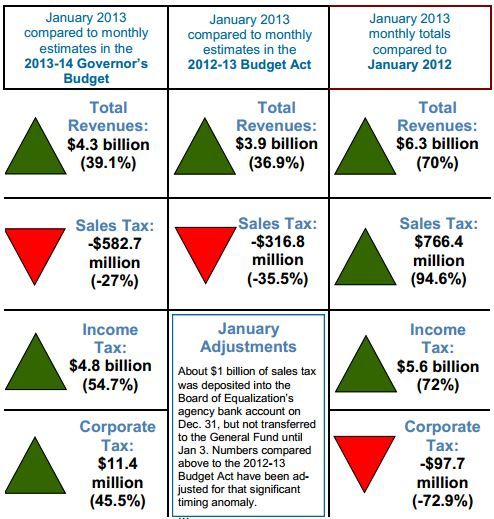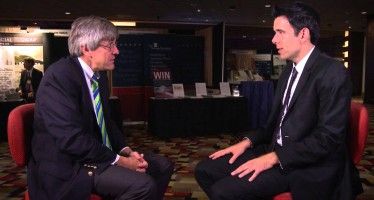Are higher taxes killing CA tax collection?
By Chriss Street
In January, California state tax collection beat Gov. Jerry Brown’s 2013-14 budget projections by $4.3 billion, or 39.1 percent. The out-performance was due to two expected one-time events that took place: $1 billion in delayed sales tax deposits and $3.3 billion of taxes on capital gains, dividends and bonuses collected in January for a prior period.
But something should be very disturbing to giddy state politicians and lobbyists who are cranking up for a new spending spree: January sales taxes plunged by $582.7 million, or 27 percent. It seems that Taxifornia finally raised taxes so high that affluent residents are moving their investments and spending elsewhere.
Many financial analysts declared the California debt crisis over two weeks ago, after the Legislative Analyst’s Office said the state was on track to collect $5 billion more in tax revenue in January than estimated in the governor’s budget. The revenue was expected to come from high-income earners cashing out of investments early to beat the rise from 15 percent to 20 percent in federal capital gains tax rates as part of the congressional fiscal cliff deal.
But according Department of Finance Spokesman H.D. Palmer, “As we always caution, you can’t assume or build a long-term trend — good or bad — off of one month’s worth of data, because any number of factors can swing one month either way.”
January windfall
California clearly enjoyed a windfall in January, with affluent residents paying $3.3 billion more in retroactive estimated tax payments under November’s voter-approved Proposition 30 tax increase initiative and booking of capital gains, business income, and other income not subject to withholding prior to the January 1 federal tax increase. But income tax collections fell far short of the anticipated $5 billion bonanza; and sales taxes tanked.
During the campaign for Proposition 30, the $6 billion tax increase voters approved, the Howard Jarvis Taxpayers Association and other opponents warned that there is an inverse relationship, called the Laffer Curve, between rates of taxation and the resulting government tax collections. Lowering tax rates incentivizes more investment, and the volume of taxes rises. Raising tax rates strangles investment incentives, and the volume of tax collection falls.
Brown, who led the pro-Prop. 30 campaign, pooh-poohed concerns of competition from low-cost states, like Texas, if California imposed the highest statewide income tax at 13.3 percent, the highest sales tax at 7.5 percent (plus local levies) and 2nd highest gasoline tax at $.67 per gallon. Brown promised that if voters approved new taxes and he cut spending, California’s 2013-14 Budget would achieve the first surplus in a decade. At the news conference celebrating the passage Prop. 30 Brown said:
“I think the real lesson here is that voters have trusted the elected representatives, maybe even trusted me to some extent, and now we’ve got to meet that trust. But we’ve got to make sure over the next few years that we pay our bills, we invest in the right programs, but we don’t go on any spending binges like we did in the days when we had the dot-com boom.“
When asked how he would maintain discipline, Brown cited a mantra he performed every night before bed while studying at a Zen monastery in Japan in the 1980s:
“Desires are endless, I vow to cut them down.”
As Palmer said, it’s too early to say if the current trends will continue. But if they do, Brown is going to have to cut down a lot more desires that take the form of state spending.
CHRISS STREET & PAUL PRESTON
Present “The American Exceptionalism Radio Talk Show”
Streaming Live Monday through Friday at 7-10 PM
Click here to listen: http://www.ustream.tv/channel/american-eceptionalism-news
Stay Connected on our Websites: www.aexnn.com and www.agenda21radio.com
Related Articles
SD's Chance to Erase Pension Abuse Image
APRIL 5, 2011 By STEVEN GREENHUT The city of San Diego has long been the poster child for pension abuse,
Legislature picks aerospace winner
An Air Force request for proposal (RFP) for the next generation stealth bomber is about to hit the street.
Video: Would a flat tax make CA’s comeback last?
CalWatchdog.com editor-in-chief Brian Calle discusses the California economic comeback with writer Stephen Moore.





